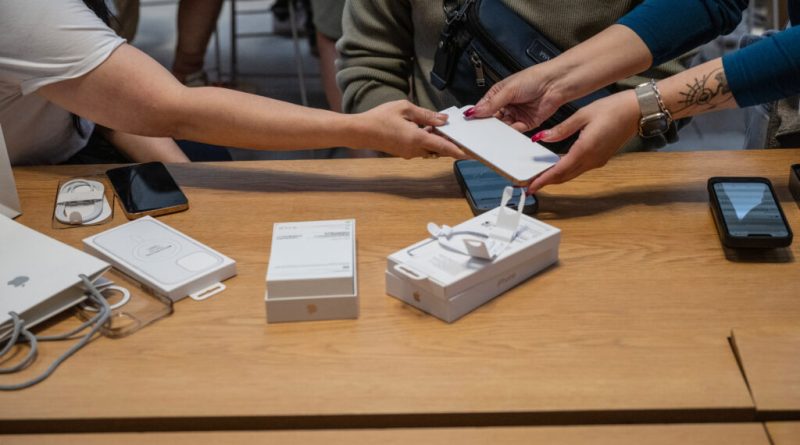Temporary Suspension of Tariffs on Phones and Computers by Lutnick
Electronics such as smartphones and computers that were exempted from certain US tariffs will soon be included in an upcoming semiconductor levy, according to US Commerce Secretary Howard Lutnick. This statement undercuts China’s assertion that recent changes were a “small step” toward alleviating trade tensions between the two largest economies in the world.
During an interview on ABC’s This Week on Sunday, Lutnick indicated that the Friday reprieve, which exempts a variety of electronics from 125% tariffs on China and a 10% flat rate applicable worldwide, is not permanent. He reiterated former President Donald Trump’s long-standing commitment to implementing a distinct levy focused specifically on the semiconductor sector.
ADVERTISEMENT
CONTINUE READING BELOW
“All those products are going to be categorized under semiconductors, and there will be a targeted tariff to ensure those products come back to the US,” Lutnick explained.
“We cannot depend on China for essential items that we require.”
His comments suggest that the exemptions released in a document by US Customs and Border Protection are intended as a transition to a different tariff structure for these products, rather than a permanent rollback of Trump’s tariffs.
This recent development represents a temporary gain for Apple and other manufacturers that depend heavily on Chinese production, and the Chinese government responded positively, encouraging Trump to take further steps.
“This is a minor movement by the US toward rectifying its misguided unilateral ‘reciprocal tariffs’,” the Chinese Ministry of Commerce stated via its official WeChat account on Sunday.
The ministry called on the US to “take significant steps to completely eliminate these misguided actions and return to the proper course of resolving disputes through equitable dialogue based on mutual respect.”
However, Lutnick and several other officials in the administration stated on Sunday that this is merely a brief pause before the implementation of new tariffs, which are likely to be lower than the current 125% rate on China established by Trump last week.
Democratic Senator Elizabeth Warren expressed concerns that the ongoing uncertainty would deter investment in the US.
“Investors will shy away from the United States as long as Donald Trump is playing a game of red light green light with tariffs and offering ‘special exceptions’ to his preferred donors,” she commented on CNN’s State of the Union.
The latest exemptions announced by Trump relate to nearly $390 billion in US imports based on 2024 trade statistics, encompassing over $101 billion from China, according to data gathered by Gerard DiPippo, associate director at the Rand China Research Center.
Upcoming Semiconductor Tariffs
The White House has long maintained that it would not impose its country-specific tariffs—125% on China, 10% on nearly all other nations—on industries set to receive separate targeted levies. Trump has already launched such tariffs for steel, aluminum, and automobiles, and has signaled additional ones for auto parts, copper, semiconductor chips, pharmaceuticals, lumber, and potentially critical minerals.
ADVERTISEMENT:
CONTINUE READING BELOW
According to Lutnick, the semiconductor tariffs will likely be introduced within the next month or two. He mentioned that a notice related to semiconductors would be published in the federal registry this week, although specifics were not provided.
US Trade Representative Jamieson Greer also emphasized that these products would be subject to a different tariff structure.
“They will not escape tariffs aimed at reshoring; they will simply fall under a different classification. It’s a transition from one set of tariffs to another,” Greer stated on Face the Nation with Margaret Brennan on Sunday.
Trump hinted at further announcements to be made on Monday.
“We’ll be very specific on Monday,” he told reporters aboard Air Force One. “We’re generating significant revenue as a country.”
Friday’s announcement marked the first instance in which the Trump administration released a detailed list of products considered to fall under the semiconductor category, which are integral to various electronic devices. While the sector-specific tariff does not have to be applied to the same list, Lutnick suggested it would.
It remains unclear what tariff rate will be imposed on semiconductors, but other industries have previously faced rates of 25%. These tariffs may be more enduring than Trump’s country-specific rates, which are based on a more precarious legal foundation and are subject to potential negotiations.
The tariff reprieve does not cover a separate Trump-imposed levy on China—a 20% duty aimed at urging Beijing to take action against fentanyl by curbing the shipment of precursor materials. Other existing levies, some of which predate Trump’s current administration, also seem unaffected.
Regarding China, “everyone is obligated to pay at least the 20%, and these specific components are being processed through a separate procedure overseen by the Department of Commerce under section 232,” Lutnick informed ABC.
© 2025 Bloomberg L.P.
Follow Moneyweb’s in-depth finance and business news on WhatsApp here.

